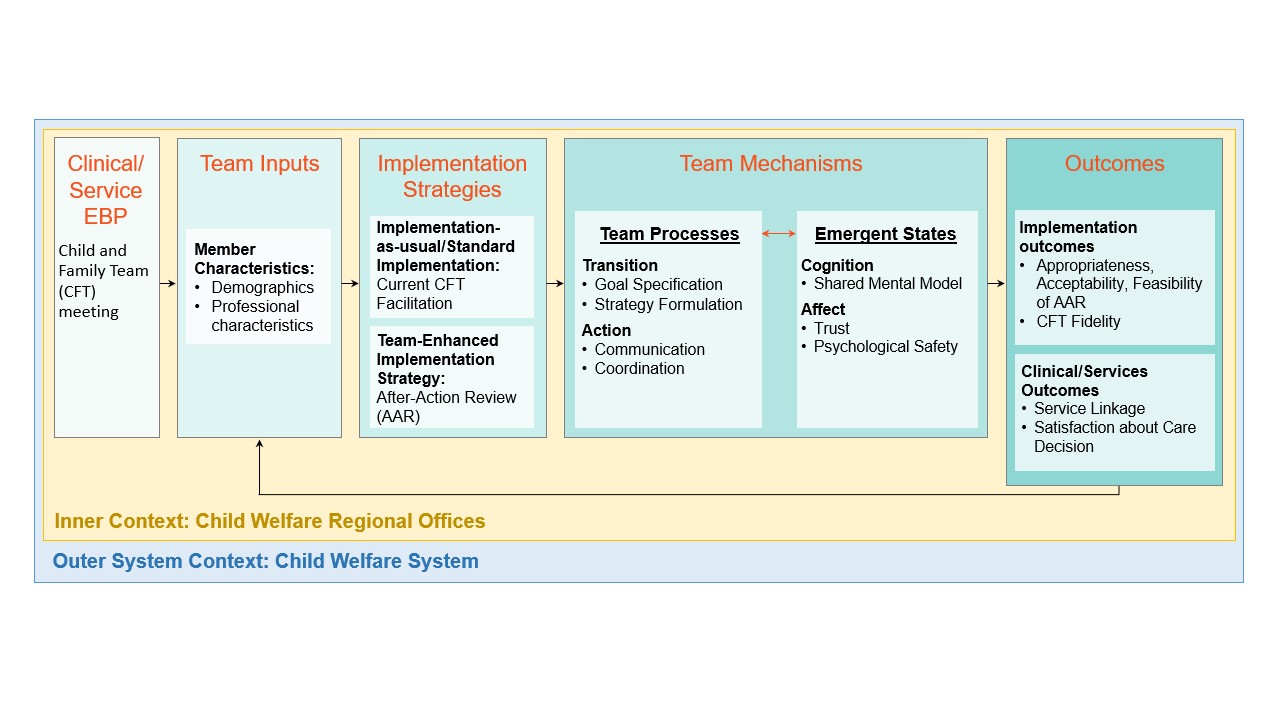R34 #1 - Applying After-Action Reviews to Child and Family Teams to Improve Mental Health Service Linkage within Child Welfare Services
Principal Investigator(s): Gregory Aarons, Ph.D. (UC San Diego), Danielle Fettes, Ph.D. (UC San Diego), and Marisa Sklar, Ph.D. (UC San Diego)
Project Summary
Half of child-welfare involved children and adolescents meet criteria for at least one current mental disorder. Shared decision-making for Action Plans is vital to the mental health and wellbeing of children and families in Child Welfare Services (CWS), with fewer child removals and fewer recurrences, thus resulting in decreased risk of child trauma, behavioral concerns, and mental health concerns. Yet, neither parents nor caseworkers perceive that Action Plans include mutual influence, and parents feel they have no voice or input. Child and family team (CFT) meetings are required for each child or youth within sixty days of entering CWS, and are family-centered and collaborative ways to develop individualized, effective service plans based on mutual agreement. Relying on teamwork approaches, CFT meetings intend to give children and families a voice in creating and guiding their case plans, suggest children do better when connected to their families and empower families to work with CWS agencies, and address organizational need for teams to perform complex, interdependent, dynamic, and ambiguous tasks.” Yet, in CWS CFT meetings, the quality of teamwork can be impaired by the inherent challenges of serving multiple needs and viewpoints that vary across family members and professionals, as well as the pressures and constraints of CWS. Innovations from team effectiveness research hold promise in facilitating improvements in shared decision-making within CWS.
Team Development Intervention Used in Project
After-Action Reviews (AAR) - The after-action review (AAR) is a relatively simple, inexpensive, quick, and powerful tool to improve learning, performance, and the effectiveness of teams and individuals. AARs are active self-learning processes wherein team members reflect on specific performance episode to actively engage in self-discovery and improve learning in a annuities/non-judgmental manner. AARs have become a common tool that organizations have leveraged in military, medical, educational, and other applications, to improve individual and team performance by approximately 20-25%. This proposal aims to apply the team development intervention of the after-action review (AAR) to improve implementation of the Child and Family Team (CFT) meetings currently used in the CWS.
Specific Aims
- Conduct a qualitative needs assessment targeting the ongoing implementation of the CFT clinical intervention in a large, publicly funded, County CWS system.
- Brief on Aim 1 Findings
- Adapt and tailor the AAR team effectiveness intervention to address the CFT services intervention needs.
- Assess mechanisms of the AAR team effectiveness intervention for CFT implementation and a novel application of natural language processing methods.
- Pilot-test the AAR implementation strategy on improving CFT outcomes, and explore team mechanisms.
- Identify and leverage CFT communication language data sources that are feasible, naturally occurring, and appropriate for the CWS context to submit to methods core for aggregation across projects.
Conceptual Model

Funding Information: P50MH126231
Study time period: 08/05/2022 - 05/31/2027
NIH RePORTER

